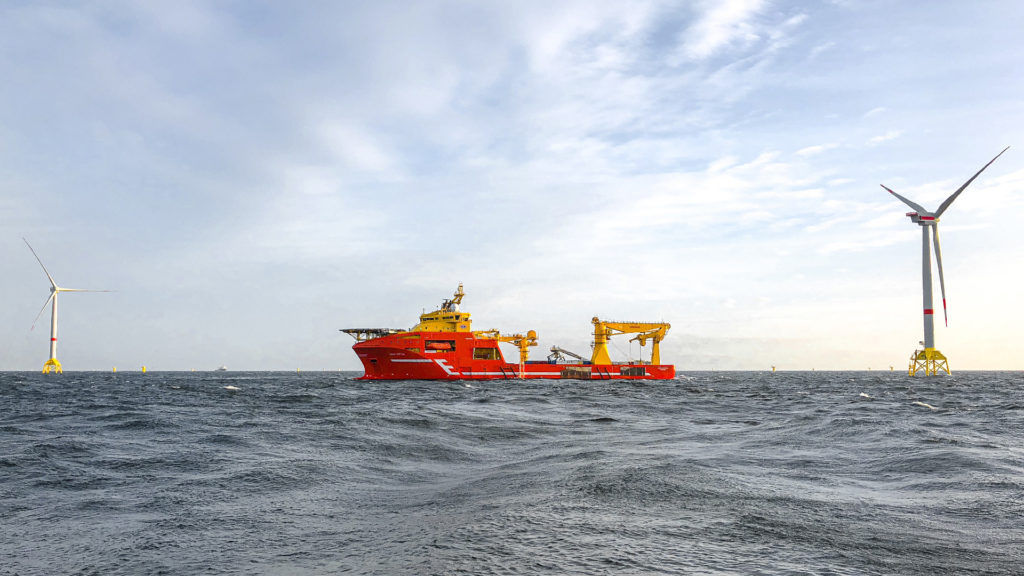Opsealog marine offshore and performance management expert, enables oil and gas companies to minimize atmospheric impacts at sea.
Toulouse, France – January 16, 2020. French marine offshore and performance management company Opsealog proudly announces its 2019 Environmental Impact results. We have achieved an impressive 10% reduction in Gas Emissions related to Marine Offshore Operations in partnership with its E&P clients. Monitoring over 400 vessels worldwide, the company aims to reduce even more the environmental impacts at sea in 2020 by promoting good practices and ensuring procedure compliance.
Arnaud Dianoux, CEO and co‐founder of Opsealog, commented: “The successful results we attained in 2019 are equivalent to 10 days of carbon‐neutral activities per vessel per year. When projected to a global fleet of a major E&P company, that number could reach over 1000. This exceptional performance was possible only due to the implementation on a global scale of Marinelog, our Performance Management Service as well as our clients’ commitment. The tool and service provided by Opsealog enable Oil & Gas Operators to boost Marine Offshore Operations efficiency by improving operational practices on four use cases: Fuel Efficiency, Fleet Utilization, Environmental Impact, and Cost Control.”
The Energy industry presents major challenges in terms of environmental impact
Today, one of the industry’s most significant challenges is to fulfill energy demands while minimizing global impacts on the environment. Propelled by stricter environmental regulations such as ECAs (Emission Control Areas) of MARPOL, the E&P sector is demonstrating a major interest in reducing gas 2019 figures
- 115 % Net Revenue Growth
- 64% Fleet Growth
- Active in 14 countries
- Since 2016 17 866 m3 of fuel saved
- 48 100 Teq CO2 emissions saved
Offshore Supply Vessels (OSVs) are responsible for the atmospheric impact primarily caused by the combustion processes of Diesel Engines. The sophisticated modus operandi of OSVs allows them to perform various operations using different engine configurations. Consequently, their environmental impact becomes difficult to predict or measure. It is not only essential to understand the operations that vessels are carrying out, but also to have a precise appreciation of how they are executing them. Vessels rarely report thoroughly on how they use their resources.. Therefore, it is difficult for Oil & Gas Operators to have a global picture of the resource utilization of their fleets.
Opsealog’s Marinelog solution provides the right data capabilities for optimum impact
E&P players need broader access to operational data to obtain relevant information and manage their environmental impact. Opsealog’s Marinelog and its industry‐changing technology help customers take advantage of the information already available, helping logistics departments make better logistic decisions.
Marinelog’s Cloud platform collects and integrates data from multiple sources (fuel monitoring systems, onboard reporting software, weather, and vessel tracking). A team of industry experts analyzes the data and provides recommendations. Opsealog’s account managers exchange with E&P clients through periodic efficiency meetings, where they promote innovative ways to improve performance. Algorithms measure and translate improvements in vessels’ operational behavior into key performance indicators, accessible through a web application and periodic reports.
Marinelog has helped E&P clients reduce the carbon footprint of their Marine operations by 10% in the last year
Marinelog’s Environmental feature allows Affiliates and headquarters of Oil & Gas companies to better report environmental results internally and externally. Opsealog’s performance management and analysis enable Operators to measure and reduce the atmospheric impacts of specific activities and assess improvements between different periods. Marinelog also allows HSE departments to follow important environmental subjects, including Waste Management, by giving detailed information about waste generation and discharge, and also Fresh Water Management, by closely monitoring the consumption and optimizing its production onboard.
By providing the technical tools and the expertise to translate data into tangible actions, Opsealog has successfully demonstrated that data management, analysis, and consulting services combined can be an excellent tool for improving operational practice.
Curious about how we can help you towards your green transition?

